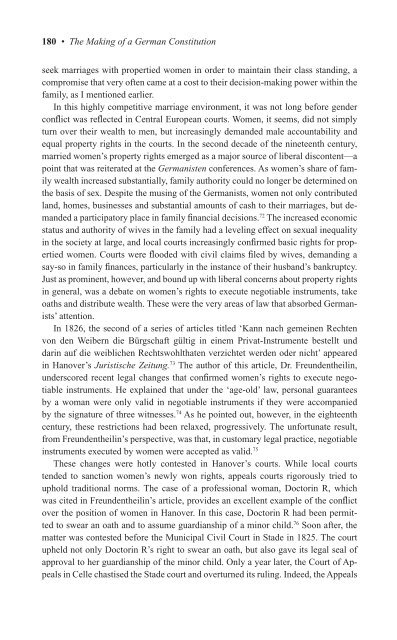Making of a German Constitution : a Slow Revolution
Making of a German Constitution : a Slow Revolution
Making of a German Constitution : a Slow Revolution
Create successful ePaper yourself
Turn your PDF publications into a flip-book with our unique Google optimized e-Paper software.
180 • The <strong>Making</strong> <strong>of</strong> a <strong>German</strong> <strong>Constitution</strong>seek marriages with propertied women in order to maintain their class standing, acompromise that very <strong>of</strong>ten came at a cost to their decision-making power within thefamily, as I mentioned earlier.In this highly competitive marriage environment, it was not long before genderconflict was reflected in Central European courts. Women, it seems, did not simplyturn over their wealth to men, but increasingly demanded male accountability andequal property rights in the courts. In the second decade <strong>of</strong> the nineteenth century,married women’s property rights emerged as a major source <strong>of</strong> liberal discontent—apoint that was reiterated at the <strong>German</strong>isten conferences. As women’s share <strong>of</strong> familywealth increased substantially, family authority could no longer be determined onthe basis <strong>of</strong> sex. Despite the musing <strong>of</strong> the <strong>German</strong>ists, women not only contributedland, homes, businesses and substantial amounts <strong>of</strong> cash to their marriages, but demandeda participatory place in family financial decisions. 72 The increased economicstatus and authority <strong>of</strong> wives in the family had a leveling effect on sexual inequalityin the society at large, and local courts increasingly confirmed basic rights for propertiedwomen. Courts were flooded with civil claims filed by wives, demanding asay-so in family finances, particularly in the instance <strong>of</strong> their husband’s bankruptcy.Just as prominent, however, and bound up with liberal concerns about property rightsin general, was a debate on women’s rights to execute negotiable instruments, takeoaths and distribute wealth. These were the very areas <strong>of</strong> law that absorbed <strong>German</strong>ists’attention.In 1826, the second <strong>of</strong> a series <strong>of</strong> articles titled ‘Kann nach gemeinen Rechtenvon den Weibern die Bürgschaft gültig in einem Privat-Instrumente bestellt unddarin auf die weiblichen Rechtswohlthaten verzichtet werden oder nicht’ appearedin Hanover’s Juristische Zeitung. 73 The author <strong>of</strong> this article, Dr. Freundentheilin,underscored recent legal changes that confirmed women’s rights to execute negotiableinstruments. He explained that under the ‘age-old’ law, personal guaranteesby a woman were only valid in negotiable instruments if they were accompaniedby the signature <strong>of</strong> three witnesses. 74 As he pointed out, however, in the eighteenthcentury, these restrictions had been relaxed, progressively. The unfortunate result,from Freundentheilin’s perspective, was that, in customary legal practice, negotiableinstruments executed by women were accepted as valid. 75These changes were hotly contested in Hanover’s courts. While local courtstended to sanction women’s newly won rights, appeals courts rigorously tried touphold traditional norms. The case <strong>of</strong> a pr<strong>of</strong>essional woman, Doctorin R, whichwas cited in Freundentheilin’s article, provides an excellent example <strong>of</strong> the conflictover the position <strong>of</strong> women in Hanover. In this case, Doctorin R had been permittedto swear an oath and to assume guardianship <strong>of</strong> a minor child. 76 Soon after, thematter was contested before the Municipal Civil Court in Stade in 1825. The courtupheld not only Doctorin R’s right to swear an oath, but also gave its legal seal <strong>of</strong>approval to her guardianship <strong>of</strong> the minor child. Only a year later, the Court <strong>of</strong> Appealsin Celle chastised the Stade court and overturned its ruling. Indeed, the Appeals




